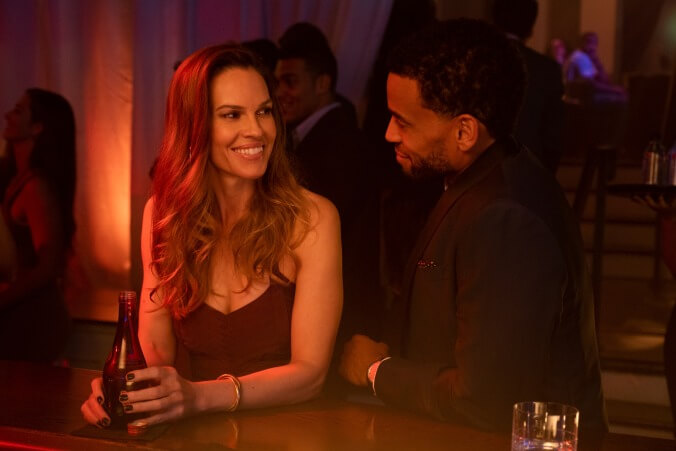Hilary Swank and Michael Ealy in Fatale Photo: Lionsgate
Note: The writer of this review watched Fatale on a digital screener from home. Before making the decision to see it—or any other film—in a movie theater, please consider the health risks involved. Here’s an interview on the matter with scientific experts.
Is Deon Taylor the most prolific director of studio films currently working in Hollywood? In the space of two and a half years, he’s delivered four thrillers with
notable casts and
throwback-y premises. (He also appears to have a sequel to his atrocious
Purge spoof/knock-off
Meet The Blacks in the can, though the
teaser trailer looks even more like a fan film than the original.) Taylor is so busy that
Fatale throws back twice: first to erotic thrillers like
Fatal Attraction, then further to the twisty noirs that inspired them. It’s not a very good noir, but compared to, say, Taylor’s
Traffik, which used the existence of sex trafficking to claim it was based on “actual events,” it represents substantial improvement.
The Fatal Attraction connection is more than casual: Derrick (Michael Ealy, coming up on two decades of playing nice young men) strays from his marriage to Traci (Damaris Lewis) on a business trip to Las Vegas. Though he has some unresolved tensions with Traci, Derrick isn’t exactly looking for an affair, making a snap decision after flirting (and drinking) with a stranger named Valerie (Hilary Swank) who practically announces her intention to blow off some steam with casual sex. Derrick immediately regrets his decision—and then regrets it further when someone breaks into his home, and the cop who shows up on the scene to investigate is none other than Valerie.
At first, she says all the right things about wanting to keep quiet and respectful; after all, exposing their one-night stand wouldn’t be great for her departmental reputation, either. That’s even truer than she lets on at first, as the movie reveals that Valerie has personal demons related to a child-custody struggle. She claims professionalism while sensing in Derrick an opportunity to ensnare her sexual partner into a series of schemes. Swank’s better than her material here, as she often is. After a few scenes designed to generate empathy for her plight, Fatale steers Valerie back toward unhinged villainy, yet something perversely likable about her dogged determination lingers. She may be dangerous, but she tries to get things done.
Perpetual motion makes Fatale more entertaining than it probably should be. On a craft level, it struggles with some of the basics. Characters drop in and out of stilted conversations about business, careers, and marital strife with no sense of life surrounding them; they might as well be going into sleep mode when they’re off screen. But the movie’s glossy look takes better advantage of Taylor’s ongoing collaboration with cinematographer Dante Spinotti, and it’s reassuring that the screenplay keeps twisting past the point of “Fatal Attraction, but the stalker’s a cop” (which, due credit, is a pretty good thriller hook). At some point in the final stretch, predictability sets in; for well over an hour before then, the movie implies a variety of directions it might go in.
What keeps Fatale from really working as a noir pastiche (or, dare to dream, a Coens-esque ghoulish comedy of violently incompetent malfeasance) is its gentle, kid-gloved deference to the idea that Derrick is a good guy, rather than a weak-willed dope or even an affable bumbler in over his head. At first, it’s an understandable mistake. Ealy, with his easy charisma and piercing blue eyes, capably conceals Derrick’s utter stupidity for as long as he can… until the movie gets ruinously greedy in its second half. Ultimately, the rich moron who tolerates a boorish business partner, impulsively commits infidelity, decides his marriage is “good now” after making his wife a single meal, and expects to be exonerated of murder charges with a self-made phone recording is supposed to be a rooting interest because the women around him are written as crazier and/or more duplicitous. That’s the ultimate twist in Fatale: how little faith Taylor has in the seductive shadows of noir.


 Keep scrolling for more great stories from A.V. Club.
Keep scrolling for more great stories from A.V. Club.